- Home
- John Scalzi
The Consuming Fire (The Interdependency) Page 8
The Consuming Fire (The Interdependency) Read online
Page 8
The captain of the Child, Daris Moria, expressed to her executive officer Lin Burrotinol her contempt for Grayland II, her science advisor and Hub’s traffic control, and ordered her ship into the shoal, on schedule.
The ship would not arrive at Terhathum on schedule, or at all. The Child would in fact be lost to the Interdependency forever. It would tumble out of the decaying Flow stream at a point several thousand light-years from any known human outpost. This is because the Flow, while thought of as a river, or road, or another sort of linear bearer of transportation, was not actually remotely like any of those things, or remotely linear. Had the Child been tossed out of the Flow stream a second earlier, it would have been only a light-year from the star Sirius A, itself a relative hop and skip from humanity’s ancestral solar system. If it had been tossed out a second later, it would have found itself much closer to the Milky Way’s galactic core.
Where it would have found itself, in any of these instances, was away. Away from Hub, away from Terhathum, away from humanity. Away from rescue. Away from life.
I’ll Always Remember You Like a Child was a ship designed to be capable of maintaining the lives and safety of its crew for five years before things would inevitably decline into chaos and madness. But like most commercial fivers, the Child was not in fact set up to sustain its crew for five years. In the Child’s case, it had been tasked with making short-haul cargo trips from Hub to Terhathum and back again, over and over, trips that took roughly two weeks each leg. There was no need to fit the ship for long-term crew survival. Until there was.
Captain Moria appealed to her crew for calm and got it, for two weeks. In another two weeks, Moria would be dead and the crew, which understood all too well what had happened to the Child, where it was (and wasn’t) and how little food and other resources it had on hand, would begin to fracture. In another month half the crew would be dead, including most of the officers. Six weeks after that and the crew would be down to thirty, in three noncooperating groups, and ship systems would begin to fail.
It would be another 277 days before the final surviving crew member, a cargo handler named Jayn Brisfelt, would record a lengthy testimonial of the last, extraordinarily depressing days of the Child and her crew, before he would then go to the security office, obtain a sidearm, retire to one of the crew lounges, put on one of his favorite comedies, and then shoot himself mid-laugh during his favorite part of the story.
The testimonial, recorded on a tablet, would be unseen and unheard by any other living thing. The tablet itself, whose internal battery would drain within two years, would lose the ability to function fifty years later even if it had been charged. The Child itself would be a cold, powerless husk within ten years. It would be never be found by humans or any other intelligent creatures, if there were any. It would drift between the stars for twenty million years before being gravitationally snagged by a passing red dwarf star, which it would orbit for another six million years in a comet-like path before falling into the star and vaporizing into its constituent atoms.
But this was all in the future.
At the moment, the collapse of the Flow stream between Hub and Terhathum was confirmed by a simple procedure: A research drone attempted to fly into the Flow shoal and was unable to. Where the Shoal had been, only moments before, was nothing but conventional space-time, and vacuum. Other ships sounded the area, on the idea that the Flow shoal might have moved, or was moving, a thing that had rarely been seen but which was theoretically possible. It was not moving. It was, simply, gone.
It would take weeks or months for the news of the collapse of the Terhathum stream to reach all the systems of the Interdependency (including Terhathum itself, now nearly one month away from Hub), but within the Hub system, the effect was immediate:
On the Hub Stocks and Commodities Exchange, stocks plunged and commodity futures collapsed and billions of marks’ worth of value vaporized almost instantly. A very few speculators, having shorted the market, momentarily found themselves almost ridiculously rich, until trading was halted entirely and gains and losses frozen.
Several mercantile houses filed claims to the House of Aiello, which held the monopoly on insurance, for losses incurred because of the (now almost certainly confirmed) collapse of the Flow stream from End to Hub. The claims were for lost ships, cargo and crew, and ran collectively into the billions of marks. The House of Aiello rejected nearly all of these claims, asserting, not entirely unreasonably, that the collapse of the Flow streams constituted an Act of God.
Shops and markets across the entire Hub system were swamped by panicked shoppers who came in first for essentials, and then for anything that was left. Overwhelmed store owners and managers tried to assure their customers that the collapse of a single Flow stream did not mean they were immediately doomed to starvation and despair. This did not go as well as they hoped.
Police and security forces across the system shifted to high alert and prepared for rioting. The good news was that the panicking seemed largely contained to the shopping experience. The bad news was that no one believed that would stay true for very long.
The Church of the Interdependency and other religions found their places of worship jammed, as the faithful, the newly faithful and the not-actually-at-all-faithful-but-this-is-some-weird-shit-and-I’m-hedging-my-bets came in and, depending on experience, prayed, meditated or wondered what it was exactly they were supposed to do now that they were there. Priests, ministers, rabbis, imams and other religious leaders were on one hand delighted to be useful in a moment of spiritual and existential crisis and on the other hand well aware that this was the theological equivalent of shoppers making a panic run at the market, with their new parishioners grabbing at anything and hoping it would get them through.
In Hubfall, the newly fervent who weren’t at a church found themselves at the gates of Brighton, the local imperial residence. Everyone in the Hub system was aware of Grayland’s visions for the future of the Interdependency, and her championing of Lord Marce Claremont, whose scientific findings had predicted the collapse of the End and Terhathum streams. Whether they believed her visions were sincere, a ploy to gull the credulous, or a sign of mental instability, they now had reason to believe she was onto something. And so they came to Brighton, some to revere, some to pray, and some because even if they didn’t want to go to a church, they wanted to be somewhere in this teleologically deeply unsettling moment.
The emperox, however, was not at Brighton. She was at Xi’an, the massive imperial habitat hovering over the planet of Hub and the city of Hubfall. She was in communion, some suggested, with her ancestor Rachela, the only other prophet-emperox, planning her next move, her next announcement, to save her people and her empire.
Which was not entirely wrong, as far as it went.
* * *
Archbishop Korbijn couldn’t say she was entirely thrilled to receive her next visitor, but at this point there didn’t seem much that she could do to refuse him. And so into her offices at the Xi’an Cathedral Complex walked Lord Teran Assan.
“Welcome, Lord Assan,” Korbijn said, with what she hoped was enough politeness.
Assan did a small bow with his head and swiveled his head around, taking in Korbijn’s private office, which was immense and exquisitely appointed. “This is impressive,” he said.
“Thank you,” Korbijn said. “I am the head of my church.”
Assan nodded. “Not a church that’s big on humility.”
“We were founded by a scion of a merchant family who then became the emperox of an interstellar civilization, so, no. Not really.”
“Speaking of merchant scions who became emperoxs, I assume that you heard the news that Grayland II is going to address parliament.”
“I’d heard,” Korbijn said.
“There’s speculation that she will use the occasion to announce martial law. Seeing as how her pet scientist’s prediction about the collapse of the Terhathum’s Flow stream panned out and now people ar
e in a panic.”
“It’s not a panic yet.”
Assan tilted his head and smirked. “Really.”
“Really,” Korbijn asserted. “People are shaken and afraid, yes. But they’re not burning things.”
“Yet.”
“Hopefully not ever. Fires in closed habitats are never good things.”
Assan motioned with his head out the window, where a crowd had gathered on the lawn of Xi’an Cathedral. “Your business is doing well in this moment of crisis.”
“You had a reason to want to see me, Lord Teran?”
“What will the church do if the emperox declares martial law?”
“Is that why you came to see me?”
“It’s part of it,” Assan said. “As a representative of the guilds on the executive committee, I’ve been fielding a number of concerned calls and correspondence from noble houses and guild representatives. I know my counterparts in parliament have been doing the same with their own constituents. But your constituency isn’t people, Archbishop. It’s the church itself.”
“You say that like we don’t have parishioners, Lord Teran.”
Assan motioned back toward the crowd. “More now.”
“I’m saying I disagree with your assessment.”
“As you will, but you still haven’t answered my question.”
“I haven’t given it any thought,” Korbijn said. “I haven’t given it any thought because this is literally the first I’ve heard of such a thing. I’m not inclined to give snap judgments on hypotheticals. I might as well ask you what you would do if Grayland announced she was abolishing breakfast.”
“I’m pro-breakfast.”
Korbijn threw up her hands. “You’re missing my point.”
“I got your point,” Assan assured her. “But I dare say you’re missing mine. I’m not offering you a random hypothetical, like outlawing a meal. The emperox addressed the church in her capacity as its leader and announced she was having visions—a thing unheard-of in a millennium—and obliged you as a church to follow her lead.” He waved toward the crowd at the cathedral. “She played that one very well, I’d say. You have an influx of freaked-out people flooding your churches and cathedrals, and suddenly your institution, the thing you represent, Archbishop, has more power. But it’s power you have on loan from the emperox, who set it up with her canard about visions.”
“What are you suggesting?”
“I’m not suggesting it, I’m saying it out loud: She pulled a coup on you—on you specifically, Archbishop—and used the collapse of two Flow streams to shift the power of the church onto her. And she did it so well that apparently you haven’t even noticed it yet. Unless you have and are perfectly fine with it.”
Korbijn opened her mouth to address this, but Assan continued. “And now the emperox wants to address parliament, right after the Terhathum Flow collapse, when people are scared, and vulnerable, and looking to be reassured, and politically persuadable. Given all of that, does my question about the possibility of the emperox declaring martial law sound like a random hypothetical to you now?”
“No,” Korbijn said, after a moment.
“So back to my question.”
“But neither does it sound probable to me,” Korbijn continued, ignoring Assan’s interjection. “I’ve worked with this emperox for her entire reign so far. I knew her before she was emperox. Grayland is many things, Lord Teran, not all of them desirable in an emperox. But power-hungry is not one of them.”
“And if you’re wrong?”
“What if you’re wrong?” Now it was Korbijn’s turn to motion to the crowd outside. “Your assessment of Grayland’s coup of the Interdependent Church glosses over the fact that at no point either before or after her address to the bishops has she tried to exercise any control of the church. She’s not the one in this office, setting policies and practices and doctrine. I am. She’s not the one assigning priests to churches. Bishop Carnick is. She’s not administering our social services. Bishop Ornill is. For now.”
“For now?”
“He’s thinking of resigning. A sudden crisis of faith, he said. But whoever will take his place, they won’t be put there by the emperox. Which is my point to you, Lord Teran. For a coup to occur, power has to shift. None has.”
“If you say so, Archbishop,” Assan said. “And now I think I have your answer. Thank you.” He nodded and left as abruptly as he’d entered, glancing around at the office again as he did.
Korbijn stood there for a moment wondering what in fact had just happened, and then sat down at her desk, disquieted. She buzzed for Ubes Ici, her assistant.
He was at the door in an instant. “Yes, Your Eminence?”
“Set a meeting of my advisors for this evening,” Korbijn said. “Seven o’clock. Tell the bishops to clear their schedules if necessary.”
“May I tell them what the meeting is for?”
“I need their advice. On the emperox.”
Ici paused as if to ask for further guidance, but thought better of it. “Yes, Your Eminence.”
“And, Ubes?”
“Yes?”
“Schedule a dinner service and refreshments. It’s going to be a long meeting.”
* * *
“And how did Archbishop Korbijn take to your suggestion she’s been played?” asked Jasin Wu.
“She denied it, obviously,” Assan said. “But the point wasn’t to get her to agree. The point was to plant the seed of doubt. She already had doubts, of course. Someone of her position doesn’t just go along with a brand-new emperox spouting about prophecy. That’s a threat to her personal power and influence.”
Jasin grunted. The two of them were in Jasin’s office in the Guild House on Hubfall, all clean lines and executive power, as befitted Jasin’s position on the Wu board. The two of them had tumblers of whiskey in their hands, which Assan reflected was as much a cliché of executive power as the big office they now stood in. “When the time comes, I’m going to need her as an ally, Teran.”
“I know that, Jasin.”
“Good. Because that time looks like it’s coming sooner than later.”
“Because of the collapse of the Terhathum Flow stream.”
“Because that’s only going to be the first. Well,” Jasin amended, “second. But the other ones are going to happen, and we need to be prepared before too many of them collapse.”
“Prepared for your coup.”
Jasin grimaced. “Don’t say that word out loud, Teran. For fuck’s sake.”
“Call it what it is, Jasin. You and I both know it’s necessary. It’s why you maneuvered to put me on the executive committee in the first place. To make the case for it to the other members.”
Jasin glanced over. “Word is that you’re not all that popular on the committee. The word ‘asshole’ gets attached to you a lot.”
“I’m just being me.”
“It’s true you’ve always been an asshole. I say that with respect.”
“I know. There’s no point in me pretending to be who I’m not. The people on the committee aren’t stupid. They would see through that. So I’m an asshole. But I’m an asshole who has a point. And they can’t deny the point, as much as they might dislike me.”
“That’s optimistic.”
“It’s working.”
“Let’s hope so.” Jasin took a sip from his tumbler. “Nadashe Nohamapetan is still alive.”
“I heard.”
Jasin glanced over to Teran. “Is she alive because you told Deran I was planning to have her killed?”
“No,” Assan said, scornfully. “She’s alive because Deran’s office is three doors down and the House of Wu is incredibly leaky with information.”
“I hinted to you I was planning something.”
“And I told no one. You know I talk to Deran, and Deran knows I talk to you. The difference is that Deran thinks I am his double agent, when in fact I’m yours. And as your double agent, let me tell you it’s a good thing
your attempt failed.”
“Nadashe Nohamapetan is dangerous.”
“Yes, she is. But she and her house can be your enemy or they can be your ally. The House of Nohamapetan is in disgrace right now, but it’s still powerful. It still has powerful friends. And for what you’re about to try to do, you’re going to need all the friends you can get.”
“I wish I could have seen the look on his face when you told him it wasn’t you who told me about his plan to murder Nadashe,” Deran Wu said, a half hour later, in his office. His office was slightly smaller than Jasin’s but perhaps more richly appointed, and his whiskey was better.
“Well, you know,” Assan said. “You know I talk to Jasin and Jasin knows I talk to you. The difference is that Jasin thinks I am his double agent, when in fact I’m yours. And as your double agent, let me tell you that now it’s time for you to be careful with the Nohamapetans.”
“Why? As of right now I have an understanding with Nadashe. She’ll put in a positive word for me with her house, through her lawyer. In return I’ll use our law enforcement and security contacts to make a mess of the evidence leading to her.”
“Which you will necessarily have to try to pin on Amit.”
“So?”
“So, Amit is known to have been the favorite child of the countess, so shitting on his memory to spring the child the countess undoubtedly knows killed her favorite might not be the winning play you think it is.”
Deran frowned. “I see your point.”
“I thought you might.”
“Do you have an alternative plan?”
Assan smiled. “It depends on how aggressive you’d like to be in your quest to be emperox.”

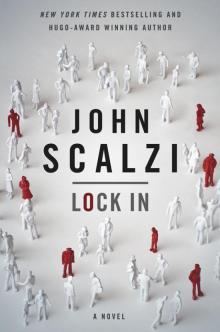 Lock In
Lock In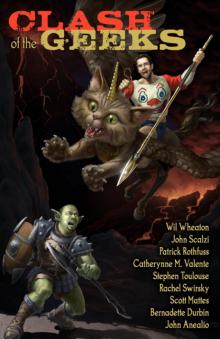 Clash of the Geeks
Clash of the Geeks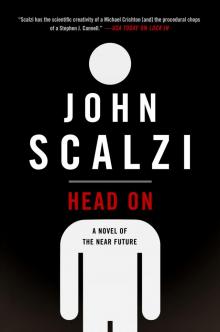 Head On
Head On The Dog King
The Dog King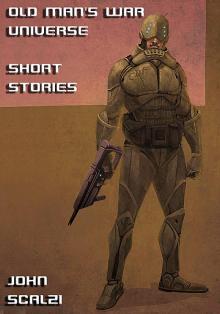 Old Man's War Universe: Short Stories
Old Man's War Universe: Short Stories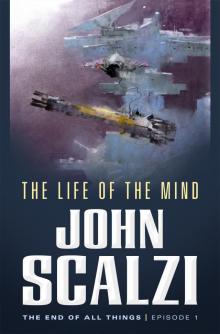 The End of All Things
The End of All Things Tales From the Clarke
Tales From the Clarke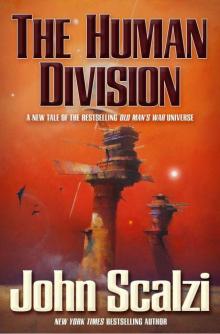 The Human Division
The Human Division The Android's Dream
The Android's Dream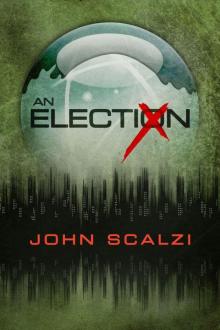 An Election
An Election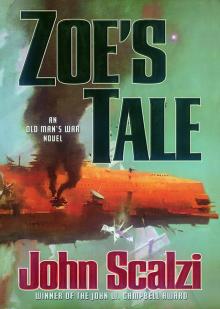 Zoe's Tale
Zoe's Tale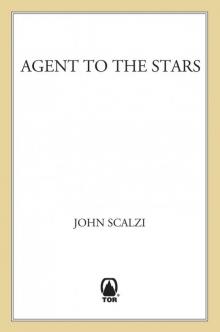 Agent to the Stars
Agent to the Stars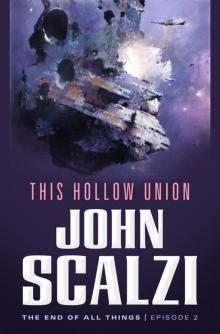 This Hollow Union
This Hollow Union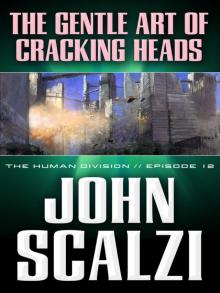 The Gentle Art of Cracking Heads
The Gentle Art of Cracking Heads Old Man's War
Old Man's War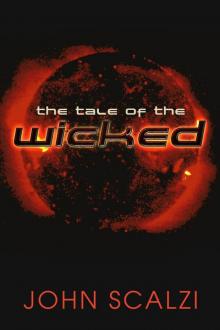 The Tale of the Wicked
The Tale of the Wicked Your Hate Mail Will Be Graded: A Decade of Whatever, 1998-2008
Your Hate Mail Will Be Graded: A Decade of Whatever, 1998-2008 Judge Sn Goes Golfing
Judge Sn Goes Golfing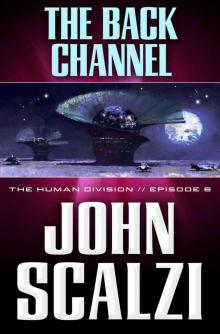 The Back Channel
The Back Channel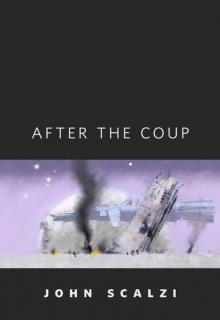 The Human Division 0.5 - After the Coup
The Human Division 0.5 - After the Coup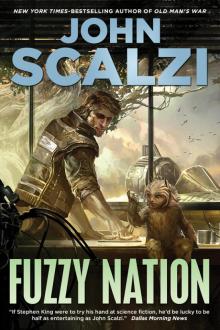 Fuzzy Nation
Fuzzy Nation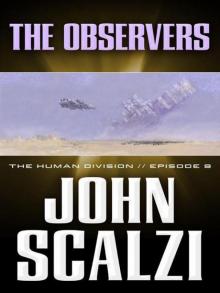 The Observers
The Observers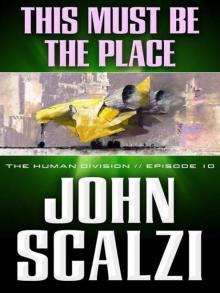 This Must Be the Place
This Must Be the Place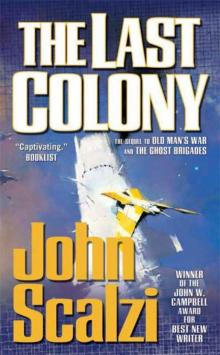 The Last Colony
The Last Colony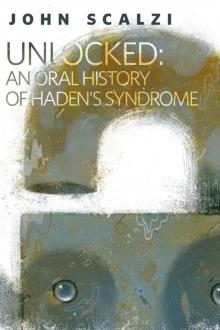 Unlocked: An Oral History of Haden's Syndrome
Unlocked: An Oral History of Haden's Syndrome A Voice in the Wilderness
A Voice in the Wilderness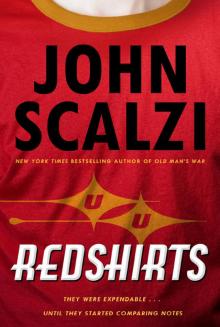 Redshirts
Redshirts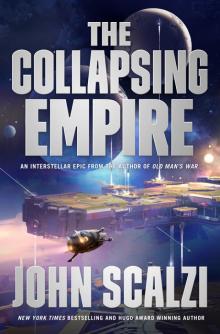 The Collapsing Empire
The Collapsing Empire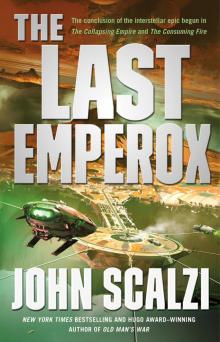 The Last Emperox
The Last Emperox The God Engines
The God Engines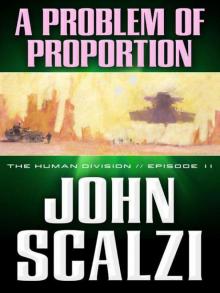 A Problem of Proportion
A Problem of Proportion THAT WAS THE MILLENIUM THAT WAS
THAT WAS THE MILLENIUM THAT WAS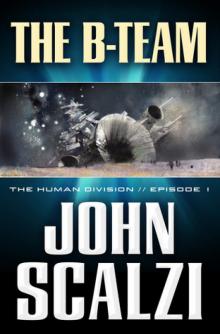 The B-Team
The B-Team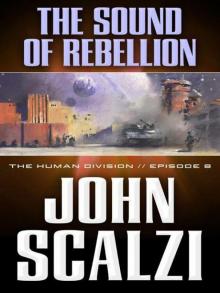 The Sound of Rebellion
The Sound of Rebellion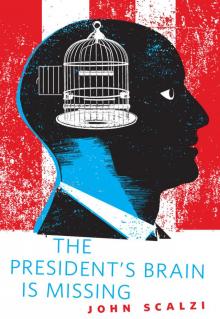 The President's Brain Is Missing
The President's Brain Is Missing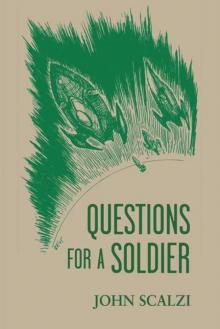 Questions for a Soldier
Questions for a Soldier Walk the Plank
Walk the Plank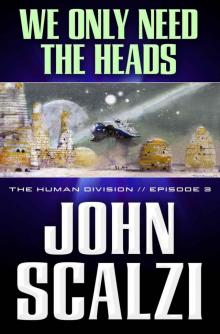 We Only Need the Heads
We Only Need the Heads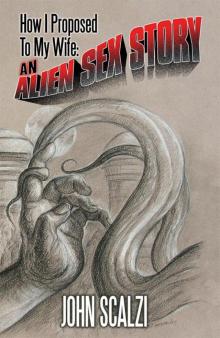 How I Proposed to My Wife: An Alien Sex Story
How I Proposed to My Wife: An Alien Sex Story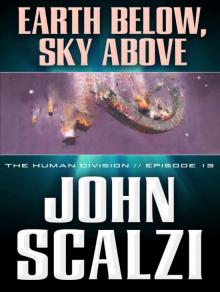 Earth Below, Sky Above
Earth Below, Sky Above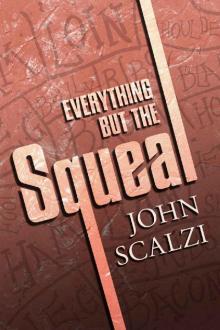 Everything but the Squeal
Everything but the Squeal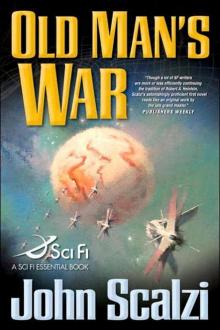 Old Man’s War
Old Man’s War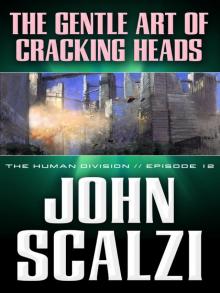 The Human Division #12: The Gentle Art of Cracking Heads
The Human Division #12: The Gentle Art of Cracking Heads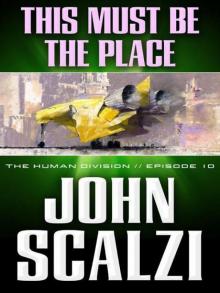 This Must Be the Place thd-10
This Must Be the Place thd-10 A Voice in the Wilderness thd-4
A Voice in the Wilderness thd-4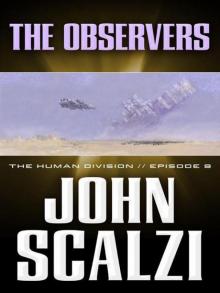 The Observers thd-9
The Observers thd-9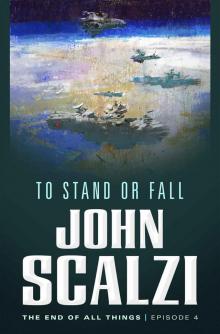 The End of All Things: The Fourth Instalment
The End of All Things: The Fourth Instalment Earth Below, Sky Above thd-13
Earth Below, Sky Above thd-13 Zoe`s Tale вбиос-4
Zoe`s Tale вбиос-4 After the Coup
After the Coup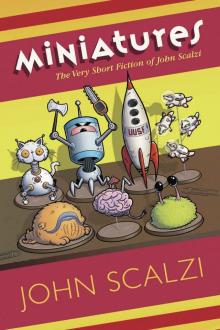 Miniatures: The Very Short Fiction of John Scalzi
Miniatures: The Very Short Fiction of John Scalzi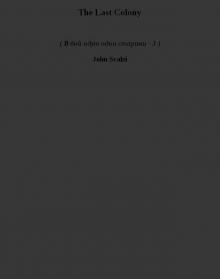 The Last Colony вбиос-3
The Last Colony вбиос-3 Tales From the Clarke thd-5
Tales From the Clarke thd-5 Old Man's War omw-1
Old Man's War omw-1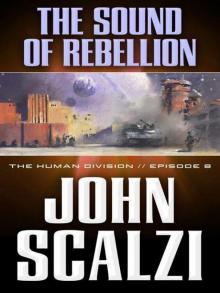 The Human Division #8: The Sound of Rebellion
The Human Division #8: The Sound of Rebellion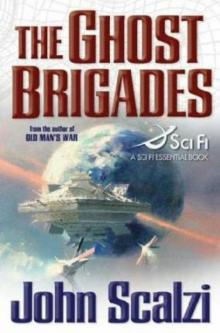 The Ghost Brigades omw-2
The Ghost Brigades omw-2 The Sagan Diary (old man's war)
The Sagan Diary (old man's war)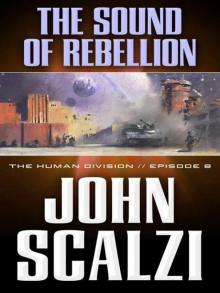 The Sound of Rebellion thd-8
The Sound of Rebellion thd-8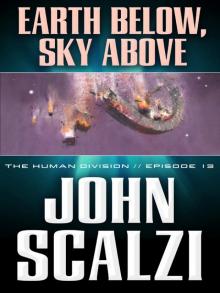 The Human Division 13 - Earth Below, Sky Above
The Human Division 13 - Earth Below, Sky Above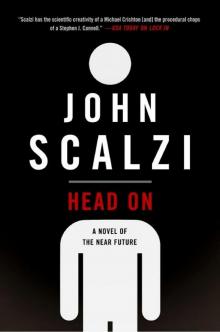 Head On_A Novel of the Near Future
Head On_A Novel of the Near Future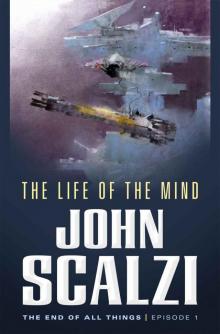 The End of All Things: The First Instalment
The End of All Things: The First Instalment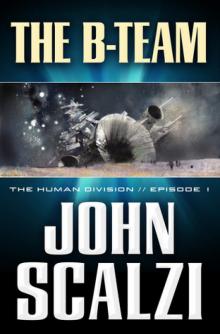 The B-Team thd-1
The B-Team thd-1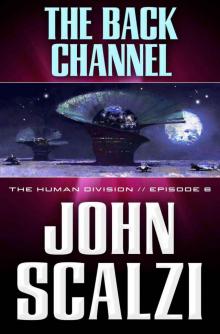 The Back Channel thd-6
The Back Channel thd-6 Walk the Plank thd-2
Walk the Plank thd-2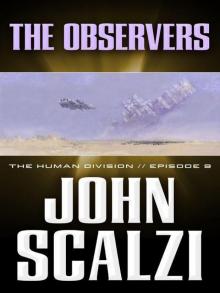 The Human Division #9: The Observers
The Human Division #9: The Observers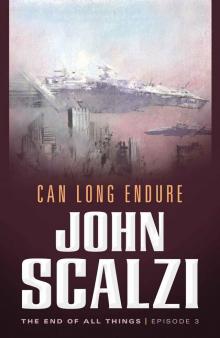 The End of All Things: The Third Instalment
The End of All Things: The Third Instalment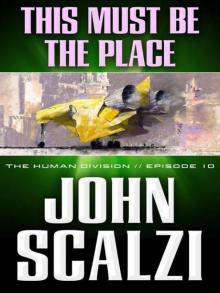 The Human Division #10: This Must Be the Place
The Human Division #10: This Must Be the Place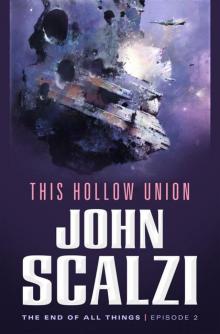 The End of All Things #2: This Hollow Union
The End of All Things #2: This Hollow Union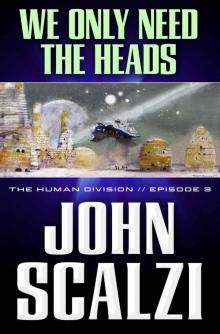 We Only Need the Heads thd-3
We Only Need the Heads thd-3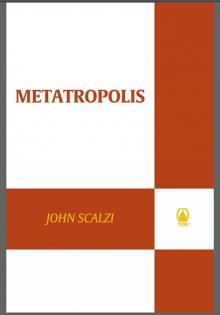 Metatropolis
Metatropolis The Dog King thd-7
The Dog King thd-7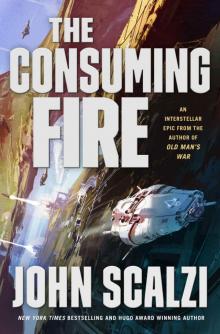 The Consuming Fire (The Interdependency)
The Consuming Fire (The Interdependency)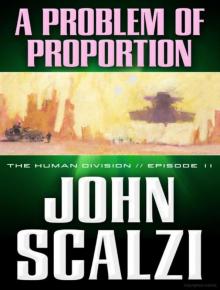 The Human Division #11: A Problem of Proportion
The Human Division #11: A Problem of Proportion